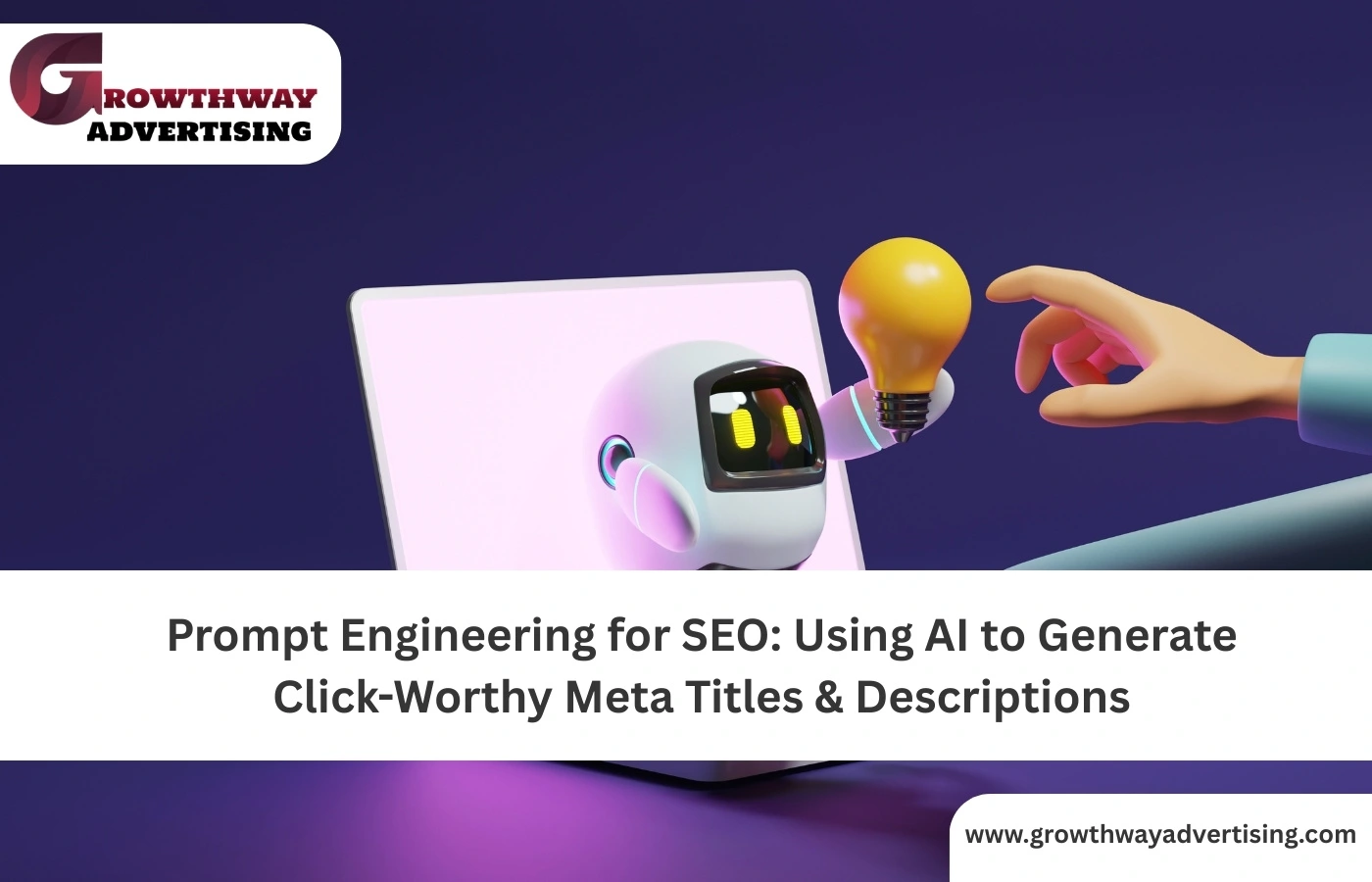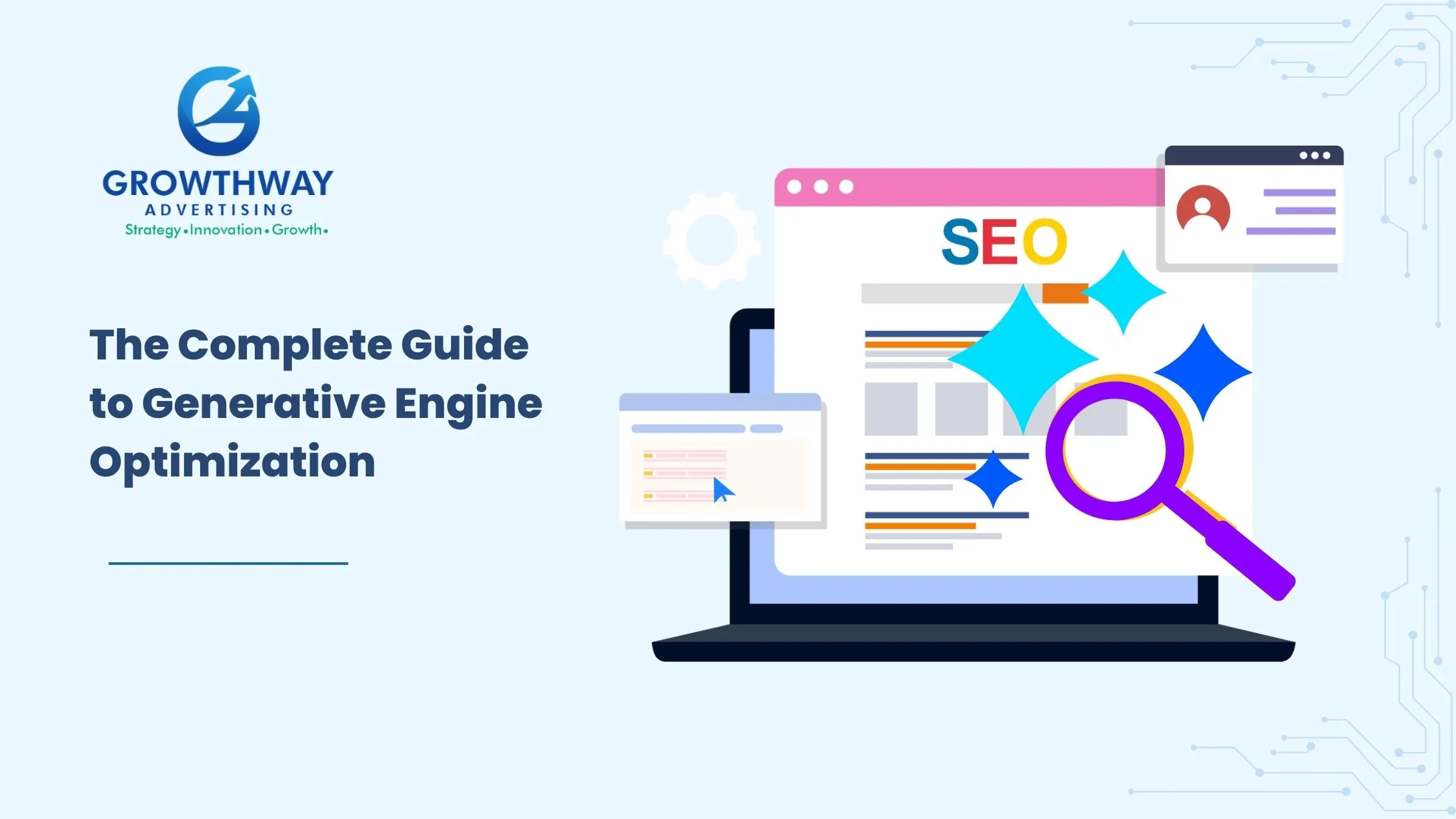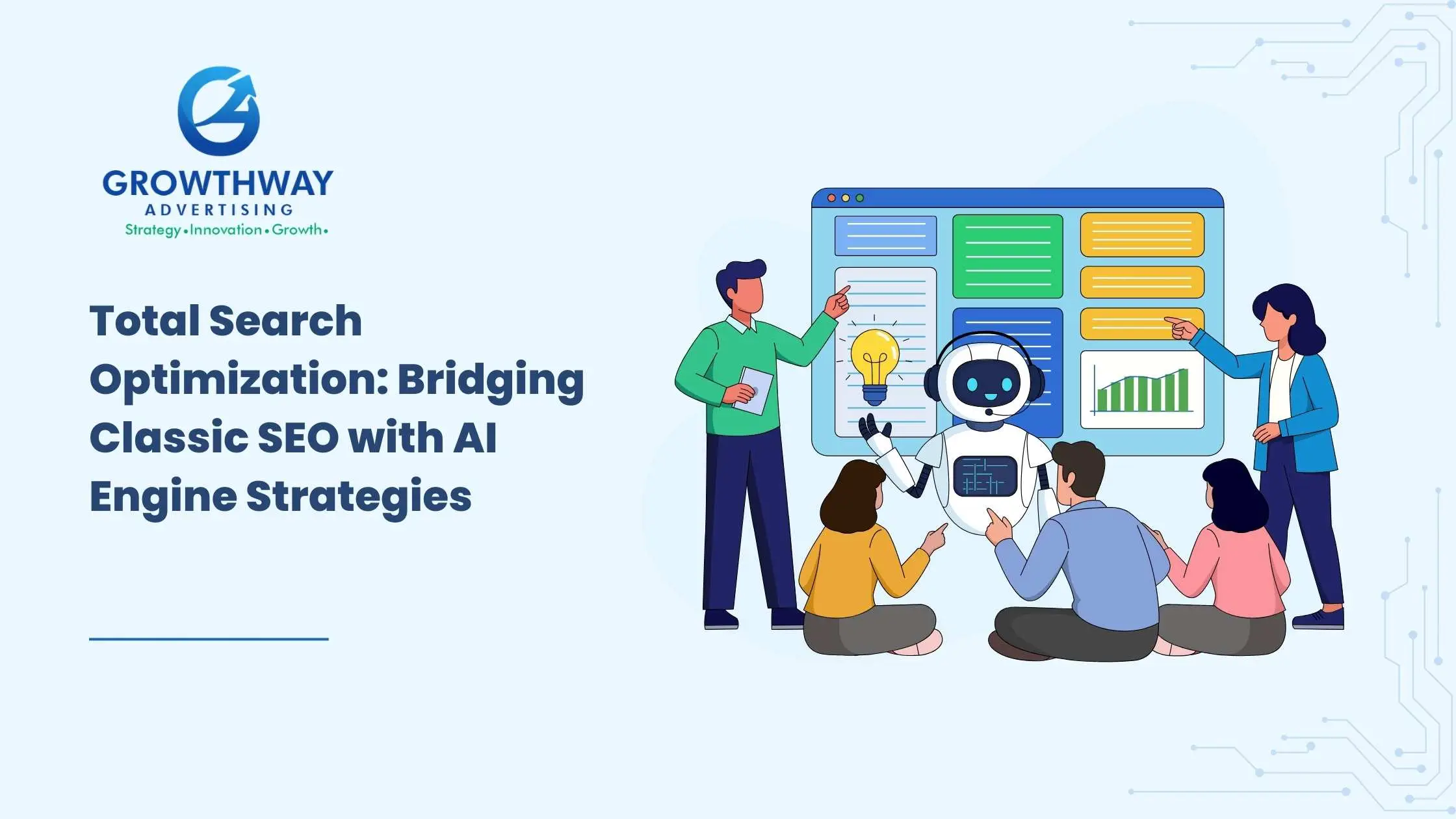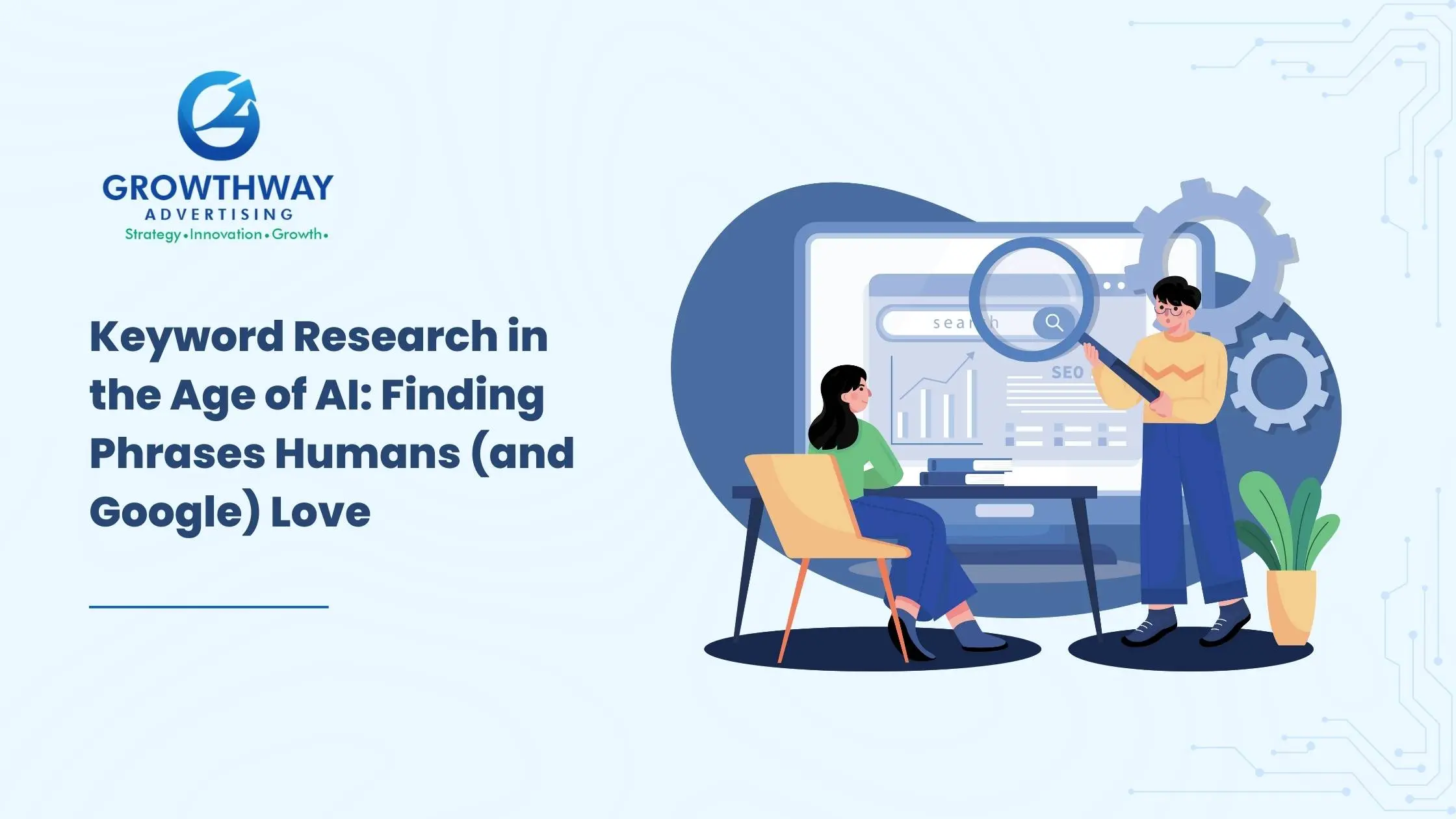Getting clicks on search results doesn’t just depend on ranking high, it depends on how your meta titles and descriptions make users stop scrolling. That’s where prompt engineering comes in. With the proper organization, you will be able to instruct AI tools to produce meta tags, which are not generic waste but strategically oriented based on your objectives in SEO marketing.
We will deconstruct how prompt engineering can change your meta content approach, and what the vast majority of guides omit when it comes to creating a strategy that will leave both search engines and humans satisfied.
Why Prompt Engineering Matters for Meta Content
Search engines evaluate title tag optimization and descriptions in order to determine relevance. They are skimmed by users to determine whether they will be clicked. It implies that you cannot afford to make AI write something and hope that it will work. You should develop SEO prompt templates to command AI to:
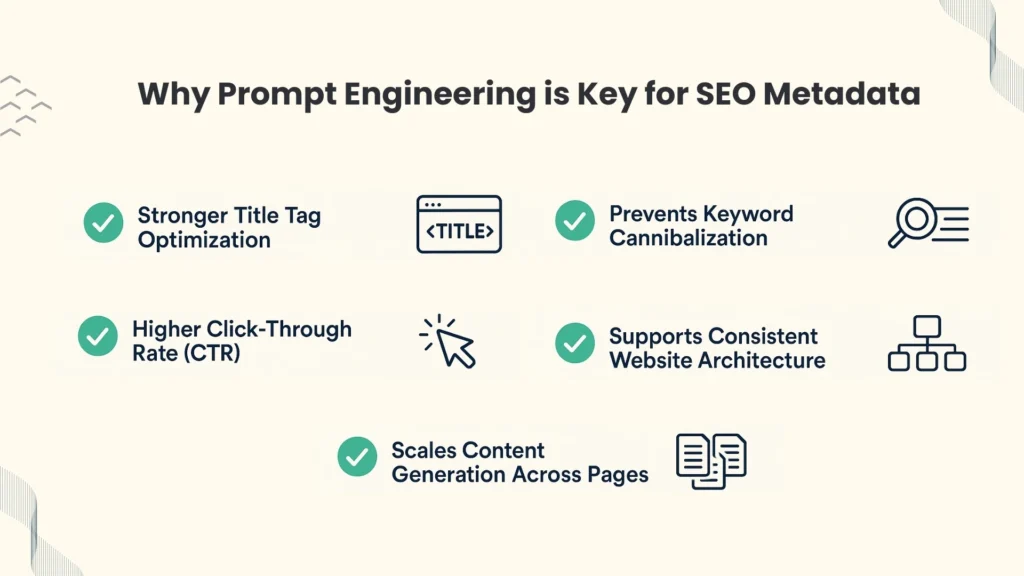
- Include keyword clustering naturally without stuffing.
- Balance brand messaging with user intent.
- Avoid keyword cannibalization by differentiating similar pages.
- Support internal linking strategy by maintaining consistency across content.
Good prompts will make the AI outputs predictable, tempting, and standardized to your web structure.
Building SEO Prompt Templates for Meta Titles
Instead of asking AI: “Write me a meta title for an SEO services page”…
Use prompts like:
“Generate a meta title under 60 characters that highlights local SEO services, includes the keyword ‘SEO services company’, and speaks directly to businesses looking for growth.”
This structure informs the AI on what to give priority to- length, keyword, and the audience. Negative instructions are also possible, such as “do not use cliches, do not use the word cheap, etc.
When applied across categories service pages, blogs, product pages, this prevents overlap and strengthens your content generation framework.
Writing Meta Descriptions That Drive Clicks
The meta descriptions are usually disregarded but have a great impact on CTR. Using timely engineering, you can drive AI further:
- Emotional hooks (“Boost your revenue with strategies built by a best search engine optimization agency”)
- Call-to-action phrases (“Get insights from an experienced SEO consultant today”)
- Clarity on benefits rather than vague promises
Example prompt:
“Write a meta description under 150 characters for an SEO agency that specializes in content gap filling and competitor analysis. Make it sound authoritative but approachable.”
That way, you aren’t merely writing text, you are programming AI to present convincing, search-engine-friendly snippets.
Avoiding Common Pitfalls with Prompt Engineering
1. Keyword Cannibalization
Unless you carefully design prompts, AI will copy the same keyword on several titles and descriptions. Use instructions like:
- “Use synonyms and avoid repeating the keyword ‘SEO services’ more than once.”
2. Generic Outputs
Unstructured prompts often produce bland results. Add role-based context, like:
- “Act as an SEO consultant advising a small business choosing between agencies. Suggest a compelling meta title.”
3. Canonicalization Implementation Gaps
AI may suggest duplicate meta structures. Pair your prompt strategy with proper canonicalization implementation to ensure search engines don’t see redundancy.
Integrating Prompt Engineering into SEO Workflows
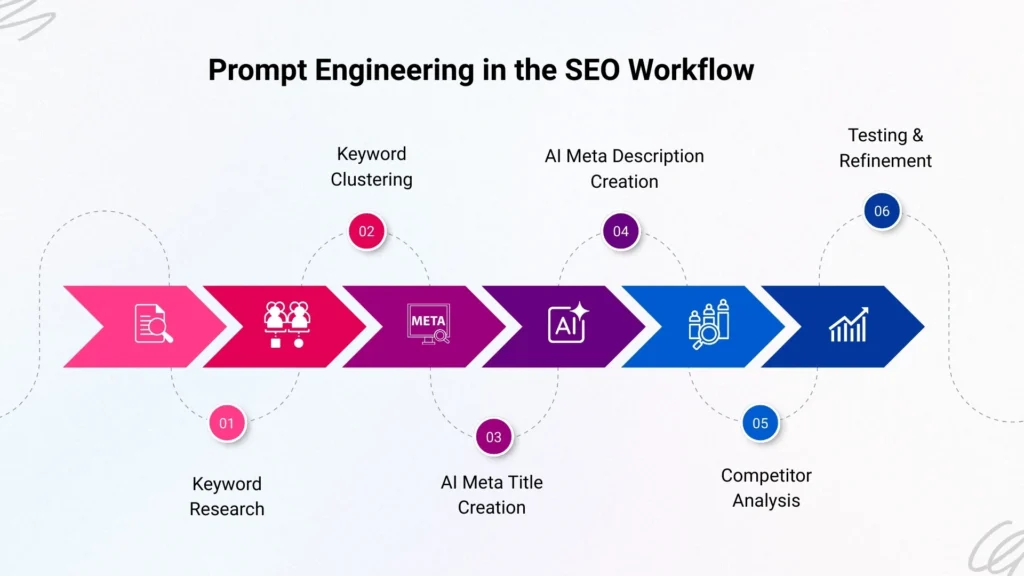
Content Generation Beyond Meta Tags
Prompts aren’t limited to metadata. You can build SEO prompt templates for:
- Blog outlines with optimized headings
- Product descriptions aligned with internal linking strategy
- FAQ sections designed around long-tail queries
Keyword Clustering & Competitor Analysis
AI is able to receive raw lists of keywords and classify them into intent-based categories. Well-structured prompts can say:
“Cluster these keywords into informational, navigational, and transactional groups for SEO services company pages.”
It can also analyze top-ranking results for gaps:
“Compare this content outline with competitors and identify content gap filling opportunities.”
Website Architecture Alignment
Artificial intelligence prompts can help to develop a regular hierarchy of URLs and titles. This makes sure that meta tags are used to represent your overall website architecture eliminating overlaps that may give Google and users confusion.
Measuring the Effectiveness of Prompt-Engineered Meta Content
This is one area most resources skip. Generating AI-driven metadata is only half the work. You need to track:
- Click-through rate (CTR): Are the AI-written titles bringing in more clicks than old ones?
- Bounce rate & dwell time: Do users stay after clicking?
- Ranking shifts: Does refined metadata help pages climb?
Build prompts that incorporate test cycles:
“Suggest three alternative meta titles for an SEO agency landing page. Make each one distinct in tone and target audience so we can A/B test them.”
By iterating, you can refine not only the AI outputs but the prompt structures themselves.
Personalization Through Prompt Engineering
Users don’t all search the same way. That’s where prompts can help you scale personalized metadata:
- Local SEO Services
“Write a meta title for businesses searching for local SEO services in [City Name], focusing on fast results.”
- Enterprise SEO
“Create a meta description under 150 characters for an enterprise client choosing a best search engine optimization agency for large-scale campaigns.”
These nuanced prompts ensure your metadata speaks to specific segments, not generic “everyone.”
Future Trends: Where Prompt Engineering for SEO is Heading

Multimodal Prompting
Search isn’t limited to text. There is an evolution of voice search, visual snippets and AI overviews. Prompts need to adapt to:
- Voice-friendly metadata (“Ask your phone…” style snippets)
- Visual SERP features (image alt-text prompts tied to content generation)
Security Awareness
As AI becomes central to SEO workflows, prompt injection risks will matter. Malicious instructions hidden in datasets could skew metadata. Building prompts that minimize ambiguity and test for clean outputs will become best practice for every SEO services company.
Audit Frameworks
Look to have predefined checklists to review AI-generated metadata – no duplication, reasonable length, containment of key keywords, and fit to internal linking policy.
Example Prompt Templates for Click-Worthy Metadata
- Service Page:
“Write a 60-character meta title highlighting expert seo services, avoiding jargon, and positioning the page as authoritative for B2B clients.”
- Blog Post:
“Generate a meta description under 140 characters for a blog on keyword clustering and competitor analysis. Focus on clarity and click appeal.”
- Local Landing Page:
“Suggest a meta title for a [City] landing page offering local seo services, including a geographic reference and a strong CTA.”
- Technical SEO Page:
“Write a meta description about canonicalization implementation and title tag optimization, framed as practical advice from a seo consultant.”
Connecting Metadata with Broader SEO Goals
Integration is the actual power of prompt engineering. Your metadata should not stand alone–it must relate to:
- Your website architecture, so users see consistent patterns.
- Your internal linking strategy, so descriptions echo key navigation terms.
- Your content gap filling efforts, ensuring every snippet supports unique search intent.
This holistic approach turns AI from a quick generator into a long-term partner in seo marketing.
FAQ’s
By guiding AI with specific instructions on length, keywords, and tone, prompt engineering creates title tag optimization that is both keyword-rich and click-friendly.
Yes. Well-designed SEO prompt templates can push AI to write persuasive meta descriptions that highlight benefits, include target keywords, and encourage clicks.
You can instruct AI to use synonyms, vary phrasing, and avoid repeating the same focus keyword across multiple pages, reducing keyword cannibalization.
AI can generate consistent titles and descriptions aligned with your website architecture, making navigation and search snippets cohesive across all pages.
Track metrics like CTR, impressions, and rankings. Use A/B testing by prompting AI for multiple versions of meta titles and comparing performance.

